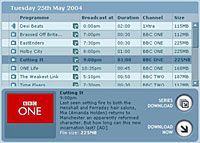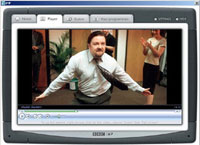 BBC New Media is to extend trials of its interactive Media Player (iMP), allowing viewers to download material from 500 hours of its television and radio programming.
BBC New Media is to extend trials of its interactive Media Player (iMP), allowing viewers to download material from 500 hours of its television and radio programming.
The latest phase of trials for BBC New Media’s interactive Media Player is scheduled to begin in September 2005 and will run for three months.
The interactive Media Player lets viewers catch up with TV and radio programmes up to seven days after they have been broadcast, with the BBC offering legal Internet download programmes to their PCs.
The latest road test follows smaller trials last summer where the BBC used a limited number of people and a small amount of rights-cleared programmes to test the concept of using peer-to-peer technology and digital rights management (DRM) to protect rights holders.
This time around, the BBC is offering around 190 hours of TV programmes and 310 radio programmes, in addition to local programming and rights-cleared feature films.
 The 5,000 trialists will be able to search for programmes they want to watch, filter programmes by channel, select subtitles and, in the case of some series, to collect and watch episodes that they may otherwise have missed.
The 5,000 trialists will be able to search for programmes they want to watch, filter programmes by channel, select subtitles and, in the case of some series, to collect and watch episodes that they may otherwise have missed.
Ashley Highfield, BBC director of new media and technology, effloresced with a curious mix of similes: “iMP could just be the iTunes for the broadcast industry, enabling our audience to access our TV and radio programmes on their terms — anytime, any place, any how – Martini Media.”
“We’ll see what programmes appeal in this new world and how people search, sort, snack and savour our content in the broadband world,” he added.
Currently, issues with rights, distribution and navigation are limiting the menu, leading to fears that without the necessary killer content to attract audiences, take-up of the service may stall.
Highfield has stated that the BBC was looking to tackle these issues through services like Creative Archive and iMP, and called on the industry to do the same.
 The pilot will use DRM software to delete programmes seven days after the programme has aired on TV, ensuring that users can no longer watch the content after that time. The digital rights system will also prevent users emailing the files to their chums or sharing it via disc.
The pilot will use DRM software to delete programmes seven days after the programme has aired on TV, ensuring that users can no longer watch the content after that time. The digital rights system will also prevent users emailing the files to their chums or sharing it via disc.
The BBC iMP pilot will use peer-to-peer distribution technology to distribute the content and Geo-IP technology to restrict the service to UK Internet users only, with Siemens Business Services, BBC Broadcast and Kontiki, assisting with the technical and play-out elements of the trial.
The Kontiki system is already being beta-tested by the Open Media Foundation in trials of a public service allowing controlled peer-to-peer distribution of rights cleared audio and video.